Batting in adjacent nets on the centre pitches of the ICC Academy in Dubai on Saturday, Shubman Gill and Abhishek Sharma took turns admiring each other's strokes. On an occasion, Abhishek wasn't entirely happy with the sound of bat on ball. He picked up one of Gill's bats and began easing himself into his shots again.
For the rest of the session, Abhishek was all power and connection and Gill poetic timing, until the coaches signalled the last set. Gill then began playing inventive strokes - reverse sweep, ramp, scoop. Abhishek, who by then had already finished his net, waited for Gill, and they walked off together, smiles on their faces.
Last year in Zimbabwe, when Gill was T20I captain and Abhishek had earned a maiden India call-up on the back of a stunning IPL season, the two realised their dream of opening together for India. But that was a second-string side. The Asia Cup in the UAE could be even more special for Gill and Abhishek, because they are set to open for the first time for a full-strength India side that's preparing for a T20 World Cup defence early next year.
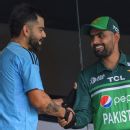
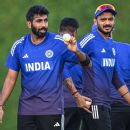
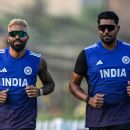
The pair's story goes back over a decade, to the Under-14s camp in Punjab where they first met. From there to the Under-16s and Under-19s, through state-level cricket and the India age-group sides, their journeys have been intertwined.
On tours, Gill and Abhishek would often be room-mates, a ritual that continued through much of their age-group days. At some point, they had to be separated only because the coaches wanted them to mingle with the other players in the group.
Shivam Mavi, who was part of India's Under-19 World Cup-winning class of 2018, recalls, "It was always Gill and Abhishek. Whether during team outings, team activities, or lunches and dinners, the two were always together."
Once, Gill and Abhishek along with Mavi's new-ball partner Kamlesh Nagarkoti planned a birthday surprise for coach Rahul Dravid during that campaign. "They said, 'let's do a cake smash on Rahul sir's face'. And they actually did it," Mavi laughs.
During India's quarter-final against Bangladesh in Queenstown, tensions ran high. There was some history: Bangladesh had beaten India in a tense warm-up game. Words had been exchanged, to the extent that the umpires had to intervene.
"Before our quarter-final, Gill and Abhishek said, 'we'll give it back to them'," Mavi says. They instructed Ishan Porel and Riyan Parag, the team's Bengali speakers, to be at their chirpiest. "Then our two Punjabi boys would chip in from time to time."
Mavi's recollections move to the semi-final against Pakistan. "Shaheen Afridi and Co were sledging Gill, saying, 'our bowling attack is not Bangladesh". Gill, batting at No. 3, went on to score a century that he celebrated aggressively, with pointed gestures. "Abhishek replied, 'our batting is not like Pakistan either'."
India went on to beat Australia and win that Under-19 World Cup, and the paths of Gill and Abhishek soon diverged. Gill made his India debut a year later while also establishing himself in the IPL, initially with Kolkata Knight Riders. Abhishek navigated the challenges of proving himself in domestic cricket, unsure whether he was a top-order batter or a finisher.
During the Covid-19 pandemic, the two were back together. The man who brought them under one roof, so to say, along with a number of other Punjab players was Yuvraj Singh. This time, there was no space for jokes or banter. Yuvraj was the boss, and Gill and Abhishek had to listen to every single thing he told them. Among his diktats: no phones at night, no parties, regimented sleep-and-wake-up schedules.
To ensure the players stuck to their routines, Yuvraj boarded them at his residence for a month, and sought special permissions for training at a time when lockdown rules were strict. Both Abhishek and Gill remember this time fondly, and credit it for toughening them up.
Today, Gill is Indian cricket's all-format poster boy and the darling of brands. A bumper maiden Test tour as captain in England, where he peeled off runs with the consistency of his teenage days, has already thrust him into the conversation for ODI captaincy whenever the selectors look to the future. He's also the T20I vice-captain now.
Gill brings with him a body of work and a transformed game that took shape in 2023 at Gujarat Titans, when he lit up the IPL with a chart-topping 890 runs at a strike rate of 157.80, including three centuries. The most improved aspect of Gill's game was his six-hitting - he hit 33 of them, the third-highest of all batters that season.
It was because Virat Kohli and Rohit Sharma were locked in as openers that Gill was only picked as a non-travelling reserve for the 2024 T20 World Cup. It has been more than a year since he last played T20Is, but his recent T20 form is compelling: 650 runs at a strike rate of 155.87 in IPL 2025. He reclaims his spot at a time when his T20 stocks are at an all-time high.
Abhishek's journey has been less straightforward. He wasn't an instant IPL sensation, and for a while he floated between roles: middle-order batter, occasional finisher, part-time spinner. Then came the realisation: his game was built to take bowlers on from the very first ball.
Days spent training under Yuvraj during lockdowns in Chandigarh reshaped his approach. Yuvraj made him train on marble slabs so the ball would skid, asked the curator in Mullanpur to prepare raging turners to force Abhishek to sharpen his bat speed and footwork. It was bootcamp-style training, and it unlocked something within him.
Abhishek emerged a different player. He was physically stronger, more fearless, and not afraid of losing his wicket in the pursuit of risk-taking. Shades of this transformation were visible as far back as in 2022, when he was Sunrisers Hyderabad's leading run-getter with 320 runs at a strike rate of 133.12. But just when it looked like he had begun to make a mark, 2023 brought a new set of challenges - Abhishek found himself shunted up and down the order.
The change in leadership at the franchise in 2024 was a turning point. Out went Brian Lara as coach and Aiden Markram as captain, and in came Daniel Vettori and Pat Cummins in those positions. Impressed by his hitting, they returned him to the top of the order, this time alongside Travis Head. The returns have been spectacular. The last two IPL seasons have brought Abhishek 923 runs at a strike rate of 198.92. No batter in the tournament with a cut-off of 500 runs has scored quicker.
"I stopped worrying about getting out," Abhishek said in post-match chat last year, and it's been clear to see whenever he has batted. With a settled role and the license to attack, he has become a destroyer of all kinds of bowling, with especially frightening numbers against spin. In all T20s since the start of 2024, Abhishek has a strike rate of 232.12 against spin. For context, Glenn Maxwell, who sits in second place among those with at least 500 runs against spin in this period (where ball-by-ball data is available), has gone at 173.31.
The transition into T20Is has been smooth too: Abhishek's strike rate of 193.84 is the best of all batters with at least 500 runs since his debut. He got his run in the India side at a time when the senior players were being rested, and now, when India have turned their full attention to T20Is with a World Cup imminent, he's still there, keeping a batter as good as Yashasvi Jaiswal out of the squad.
The moment Abhishek switched to Gill's bat at training was a poignant one: it was with one of Gill's bats in Harare that Abhishek had scored his first T20I hundred, in only his second match.
Having converged and diverged so many times over so many years, the journeys of Gill and Abhishek are running together again, with a stretch of smooth road between now and next year's T20 World Cup. If they click together like they did at the nets, or like they did as teenagers, there's no telling how dangerous this partnership could be.
Newer articles
Older articles
 Greg Chappell Hails Rishabh Pant's Explosive Batting, Sees Adam Gilchrist Echoes
Greg Chappell Hails Rishabh Pant's Explosive Batting, Sees Adam Gilchrist Echoes
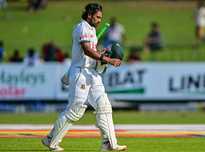 Bangladesh Test Skipper Najmul Hossain Resigns Following Sri Lanka Defeat
Bangladesh Test Skipper Najmul Hossain Resigns Following Sri Lanka Defeat
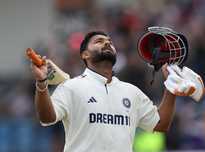 Rishabh Pant's Revolutionary Batting Style is Reinventing Cricket: Greg Chappell's Bold Claim
Rishabh Pant's Revolutionary Batting Style is Reinventing Cricket: Greg Chappell's Bold Claim
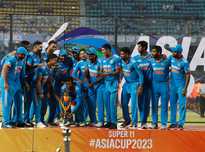 Asia Cup 2025: ACC Targets September Launch Amid Easing India-Pakistan Tensions
Asia Cup 2025: ACC Targets September Launch Amid Easing India-Pakistan Tensions
 Gavaskar Calls for Kuldeep Yadav's Inclusion in Second Test, Questions Thakur's Performance
Gavaskar Calls for Kuldeep Yadav's Inclusion in Second Test, Questions Thakur's Performance
 Pogba Resurrects Career, Joins AS Monaco After Doping Ban
Pogba Resurrects Career, Joins AS Monaco After Doping Ban
 ICC Test Rankings: Pant Hits Career-High, Bumrah Reigns Supreme, Root Still King
ICC Test Rankings: Pant Hits Career-High, Bumrah Reigns Supreme, Root Still King
 Prasidh Krishna Vows to Sharpen Length, Cut Run Rate After Headingley Expense
Prasidh Krishna Vows to Sharpen Length, Cut Run Rate After Headingley Expense
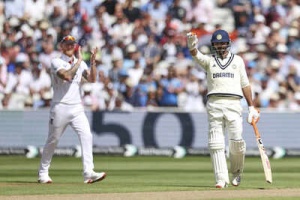 Ravindra Jadeja's Solo Practice Raises Questions Amidst India's Strong Test Performance
Ravindra Jadeja's Solo Practice Raises Questions Amidst India's Strong Test Performance
 India's Squad Update: Harshit Rana Released Before Second Test Against England
India's Squad Update: Harshit Rana Released Before Second Test Against England